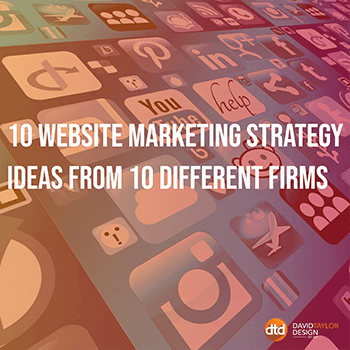
Without a website marketing strategy, your website isn’t working as hard as it could be. Simply having a webpage is not enough to bring customers in anymore. In today’s highly competitive markets your company needs to promote its site across the web, including on social media, to get more visits to your site and boost its ranking and authority.
A full website marketing strategy goes beyond SEO, although search engine optimization remains important. Your company should add in other tools, platforms and channels, like email marketing, reputation management, social media, video marketing, and even podcasting!
To give you a good idea of the various website marketing strategy ideas out there, we have put together this list of ten concepts from ten different firms. Not every idea may be the best fit for your own business, but it goes to show how varied and flexible a website marketing strategy can be.
If, after reading through this list, you feel inspired to develop your own new website marketing strategy, David Taylor Digital is ready to partner with you to create something perfect for your business, your goals, and your budget.
-
Local SEO
A local SEO website marketing strategy harnesses people who are searching for what you offer, in your local area. Even the smallest businesses benefit from local SEO. The point is not to be the biggest business in your area, but the most widely available business that has what a searcher wants.
The first step in a local SEO marketing strategy is ensuring your business information is accurate across every platform, from Google Maps to directory sites. Your company’s name, address, phone number, and correct web address are key. Business hours and closures are also important.
Reviews are also a large part of local SEO. They should be organic but positive, achieved through reaching out to happy customers to ask for a review, and responding to any negative reviews in an understanding, helpful way.
In any content you create, try to include the name of your city, town, state, or local area to capture those local searchers. That content should also be locally relevant wherever possible. You are trying to capture a local audience, so find out what they need and write for them!
-
Social Media Marketing
A social media marketing strategy puts your business where your customers are — on social media. Whether Facebook, Twitter, Instagram, Pinterest, other social media platforms, or a combination of them all, social media marketing involves creating and sharing content for those networks.
The goal, of course, is to drive more visitors to your website or otherwise meet your goals. These goals might be improved communication with customers or more awareness of your brand. Before you begin social media marketing, you need to know what you are trying to do and who you are trying to target.
Remember that overall, the more people you have engaged with your brand, the easier it is to implement ANY marketing strategy. And, much as you would with SEO marketing, make great content (or share snippets of your web content), plan for consistency and pay attention to the results.
-
Conversion Rate Optimization
Conversion rate optimization, or CRO, is a marketing strategy focused on converting web visitors to leads and leads to customers. The goal is not necessarily to bring in more visitors, but to use your existing traffic to build business.
The more conversions you have, the better, so CRO puts more opportunities for conversion in front of every visitor. Clear, attention-getting calls to action are important for converting customers. They need to know what to do to take the next step, whether it’s providing their information in a web form or clicking through to a sales site.
CRO also explores the different ways you can optimize your site, with A/B testing, multivariate testing, usability improvements, and custom conversion funnels to identify more opportunities for conversion.
-
Podcasting
Lots of people are involved in podcasting. Increasingly, companies are finding a way to use this platform in their website marketing strategies. If you have something worth sharing with the world that relates to your business, a podcast is a great way to get that information out while encouraging people to come back to your site for more information.
Check out the site above for all of the details of technical specs from choosing the right equipment, to recording, editing, and sharing your first podcast.
-
Reputation Management

People want to work with brands that they think of positively. Reputation management keeps your brand perception positive with your customers and with potential leads, working to monitor your reputation, improve it, and address any negativity.
Much of what is done in reputation management is a part of other website marketing strategies, from creating content to encouraging reviews to joining social media platforms. When you add in reputation marketing, it is simply a matter of using those strategies to monitor how people perceive your brand, control what you can, and maintain positivity once you have encouraged it.
-
Backlinking
Backlinking helps boost your website’s page rankings with external links to your site from trusted pages. The more you have, the more useful your site’s content is deemed to be. For best results, the links should be:
- from authoritative sites that are topically connected to yours.
- using your target keyword in the link text.
- from different sites, rather than one site linking your page several times.
How can you encourage backlinking? Start with quality content that is worth sharing! You can also promote backlinks outside of what people find organically by:
- participating in link roundups
- contacting web owners to offer a link that is an updated version of what they’re sharing or an alternative to a broken link
- guest posting
- sharing reviews
- marketing your content as especially shareable
-
Influencer Marketing
Influencer marketing is a subset of social media marketing. Instead of using your own channels to promote your brand, you leverage someone else’s influence. These influencers endorse your product or services to their (usually large) social following. Done right, their followers will flock to your company so they can be like the people they love to follow on social media.
It’s important to partner with influencers who match your brand, rather than shoehorning a product into a feed just because it’s popular. Users know the difference between someone legitimately endorsing a product and someone doing it for the money. Your influencer marketing campaign needs to feel as natural as possible, so be sure to carefully research influencers and be sure of your objective.
-
Remarketing (or Retargeting)
How many times have you clicked over to a website or page, then left without thinking about it again? Remarketing, or retargeting, brings people back to that scenario, reigniting the interest that brought them to your page in the first place.
Each strategy is slightly different. Remarketing collects user information, such as an email address in an abandoned shopping cart, then uses that to send an email, such as a coupon offer, if they come back to their cart. Retargeting serves ads to customers who have been to your site when they visit other pages. They are based on cookies that let the ad network know where the leads have been.
-
Email Automation

Other examples include welcoming new subscribers or web users who sign up for an account, asking for feedback on a recent purchase or sharing a deal or discount on a user’s birthday. The goal is not to spam visitors with countless emails, but to automate messages smartly to bring people back to your site.
-
Extending Products and Services
Sometimes you can extend your marketing beyond your own site and beyond social media. For example, Amazon is a helpful partner in enacting an e-commerce website marketing strategy. If you sell products online, consider Amazon fulfillment, which gives you access to Amazon’s sales platform and all of its marketing.
If you sell services instead of something tangible, there’s still an opportunity to extend your reach. Webinar creation gets your message out to a large audience. And if you use a webinar hosting service, you don’t need to worry about the tech work.
Contact us to learn more about marketing and what your business or organization can do to grow your bottom line in 2020. You can get a quote for a specific service by clicking the button below or just give us a ring at 973-317-8765.



